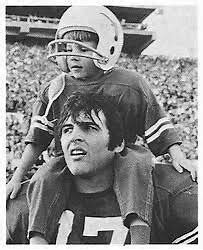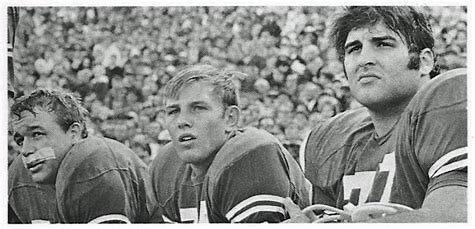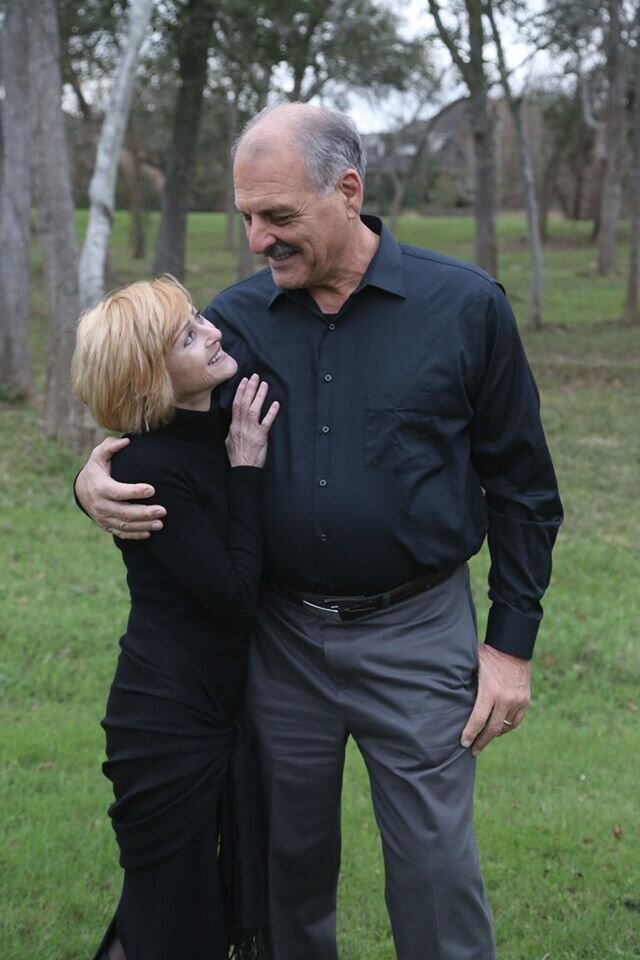Bill shares his memories of playing football for DKR in the late 1960s. Click on the oral history segment below.
BILL ATESSIS (1968-1970)
21st GREATEST PLAYER IN TEXAS LONGHORN FOOTBALL HISTORY
Bill Atessis was the best defensive player on one of the ten greatest teams in college football history. That pretty much sums it up.
Throw in career accolades such as two All-American selections and being named to the Austin American-Statesman's All-Time University of Texas team, and Atessis comes out as one of the most accomplished defense men in Texas history.
Atessis was a member of teams which set a school record 30-game winning streak that currently stands as the twelfth-longest in NCAA history and was a three-year lettermen and three-year starter at left defensive end. Including two years as a starter on the back-to-back National Champion Texas Longhorns teams of 1969 and 1970. Was voted Longhorn Defensive MVP by the players and coaching staff both in 1969 and 1970.
The Longhorns also won three consecutive Southwest Conference championships and appeared in three consecutive Cotton Bowl Classic games, winning two during that time. Was a consensus 1st Team All-American in 1970 and was second team All-American in 1969. in 1970 he was voted Southwest Conference Co-Lineman of the Year (with Arkansas All-American Defensive end, Dick Bumpas). Consensus All-SWC choice in 1969 and 1970. Also was a finalist for Outland Trophy and finished fifth in the voting for the UPI Lineman of the Year, both in 1970.
Bill played in the Senior Bowl in Mobile, Alabama, in January 1971. Is a member, University of Texas Men's Athletics Hall of Honor, being voted in during 2001. Texas Coach Darrell Royal called him a, "Super player, who never played a bad game in his three seasons with Texas .
Bill played in the Coaches' All-America Game in Lubbock, Texas, June 28, 1971. Singled out for his "tremendous game" by the NCAA as worthy of the player of the game award.
Played in what has been called "The Game of the Century" between #1 Texas and #2 Arkansas on December 6, 1969, with the Longhorns winning 15-14.
In 2005 was named to the All-Time University of Texas team by the University and was named to the Red River Rivalry All-time team by the Fort Worth Star-Telegram, also in 2005. In 2006, he was named number 16 on a list of the 50 Greatest players in Texas Longhorn history.
Bon Mallari says I don’t think there was a lineman in the country that could stop Bill Atessis one on one
Atessis attended Jesse Jones High School, in Houston. He graduated in 1967. He was a Texas All-State tackle in 1966. Atessis was the state's number one lineman in the recruiting class of 1967. He was an all-around athlete who excelled in football, baseball, and basketball. He was inducted to the Texas High School Sports Hall of Fame in 1995. In 1996 was named as one of the best lineman in the history of Texas high school football, ranking second on the Houston Chronicle list.
Atessis was a member of teams which set a school record 30-game winning streak that currently stands as the twelfth-longest in NCAA history and was a three-year letterman and three-year starter at left defensive end. Including two years as a starter on the back-to-back National Champion Texas Longhorns teams of 1969 and 1970. Was voted Longhorn Defensive MVP by the Dallas Morning News and Houston Post both in 1969 and 1970.
Played in what has been called "The Game of the Century" between #1 Texas and #2 Arkansas on December 6, 1969, with the Longhorns winning 15-14.In 2005 was named to the All-Time University of Texas team by the Austin American-Statesman and was named to the Red River Rivalry All-time team by the Fort Worth Star-Telegram, also in 2005. In 2006, he was named number 16 on a list of the 50 best names in Texas Longhorn history.
He was highly regarded after a stellar collegiate career. Was drafted by the NFL Champion Baltimore Colts. He was injured in training camp and released in mid-season. Played defensive end for the Patriots in 1971. Asked to drop weight and move to outside linebacker, a position he had never played. Left camp in July 1972, and was dealt to the St. Louis Cardinals. Was moved to offensive line there and asked to gain back the weight he lost to play linebacker. Was injured again and released by Cards. Signed as a defensive tackle by the Jets for the 1973 season yet was cut in training camp.
Tim Taylor’s interview with Bill Atessis:
My first 1969 National Champion to be interviewed for this weekly missive is Mr. Bill Atessis. No. 77 was the biggest man on that team, at 235 pounds. Coach Mike Campbell’s left end was a key player on those great Texas teams that won 30 straight games. Consensus All-Southwest Conference his junior and senior years (1969 & 1970), second team All-American as a junior, and a consensus All-American his senior year. He was voted Longhorn defensive MVP by the Dallas Morning News and Houston Post (1969, 1970). He was a finalist for the Outland Trophy in 1970.
Bill was a truly great defensive end. Bleacher Report published a 50 Greatest Longhorns list in May 2010. They list Bill as No. 21. Ahead of such Texas defensive legends as Johnny Treadwell (#39), Aaron Ross (#35), Tony Degrate (#31), Jammer, Thomas, Vasher, & Huff (30, 29, 28, & 27, respectively; lordy what I would give for 1 or 2 of those men right now), and Kenneth Sims (#24). The list is interesting, and would be a wonderful evening of debate over cocktails, but the top 4 are Earl, Ricky, Nobis, and VY. Hard to argue with that Mount Rushmore of Texas.
I had a wonderful visit by telephone with Bill Atessis and his wife when they were driving up to Austin last Friday for the 1969 reunion and Kansas game. Bill, I am most appreciative of your time. Here are the highlights:
On DKR: Coach Royal expected you to know how to do your job and to do it. There was no compromising on what he expected of you.
Great DKR Story: “He did apologize to me once in front of the whole team after a game. I was on punt return as a defenseman, because defense played punt return [no special teams], and I peeled back on the punt. As the offense’s left tackle was coming down the field I laid him out, rolled up on him, and I was flagged for clipping. When I went to the sideline Coach Royal greeted me, and he was mad. He benched me for a couple of series as my punishment, to make sure I understood that there was a consequence of my action [the clipping penalty]. Well, on Sundays we watched film. As we are watching the film from that game, Coach Royal stopped the projector, and he apologized to me in front of the whole team. He said it was a good block and a bad call.”
We talked about the 1969 game with Arkansas, the Game of the Century, and Bill shared this memory: “Coach Royal wasn’t real big on emotional pep talks. But before the Arkansas game he had told the team that “I want to let you guys know we asked Arkansas that if the game was tied at the end, could we have a playoff. We checked with the conference, and they are okay with it. However, Arkansas declined.” We all knew that if they were scared of a playoff [what would now be overtime], then they’re sphincters were so tight that they couldn’t pass a pumpkin seed.”
I asked about the great Coach Mike Campbell. “He was a different kind of animal. He made me the player I was. You have to remember that Coach Campbell and the other coaches fought in World War II. They had a nerves of steel. Being in a tight football game was nothing compared to what they had seen and been through in the War.”
Coach Campbell had his defense spend a lot of time practicing goal line stands, and as we know, that Texas defense was very good at it. Bill said “If they drove down the field and were on our 2 or 3 yard line, we felt like we had them right where we wanted them”. The Texas defense made a number of goal line stands that year, and the strength of that defense is not remembered as well as the prolific wishbone offense, but it should be.
Great stuff: “On defense we all had position responsibilities. I loved the option because the quarterback options off the defensive end [the position Bill played], and the quarterback was always watching me. If I sat on the line and didn’t create a gap, then that forced the quarterback to make the decision quick. If he kept it, I tackled him, and if he pitched it, I was in position to make that tackle.” Great example of the discipline on Coach Royal’s team and Coach Campbell’s defense, and what Bob McKay emphasized over and over: you went out and did your job.
As I noted, my conversation with Mr. Atessis was on his drive up to Austin for last weekend’s 50th reunion of the 1969 National Champions, and he said he was just excited Friday to see his teammates and be at The University as he was 50 years ago. He said he still gets goosebumps.
Bill, thanks for your time! Great to visit with you. Hook em!







